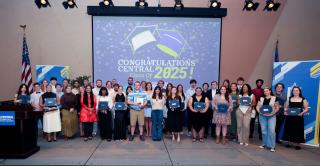
Our degree programs are designed to prepare students for careers in the earth and planetary sciences, including careers in private industry, with government agencies, or in science education.
For those interested in teaching, the Central Science Education program, along with other science departments, coordinates the teacher preparation programs at the University. Our graduates teach in schools throughout New England. Our programs include undergraduate BSED degrees, post-Baccalaureate certification, and a Master of Science degree specializing in STEM Education. Interested students should contact Dr. Jeff Thomas.
Students may also earn minors in Astrobiology, Astronomy, Earth Science, or Geology.
Our Earth Sciences B.S. degree programs all have a common core of foundational introductory courses, with five specialization options offering different upper-level electives and designed for different career paths within the earth and space sciences.
Core Curriculum
Our “Core Curriculum” consists of 19 credits of 100- and 200-level courses that introduce key concepts in the geological sciences, such as rock and mineral identification, natural hazards, map interpretation, mineral chemistry and crystallography, sedimentary processes and environments, and basic field analysis techniques.
Once students have completed the core curriculum, their upper-level electives are selected from a set of “specialization” requirements at the 300- and 400-course level that provide more in-depth instruction that is more specific to their selected career path.
Specializations
Our three “Geology” specializations (Environmental Geology, Geology, and Planetary Geology) are for students intending on careers as professional geologists, including positions within government agencies (such as the U.S. Geological Survey or NASA) or with industries in the geotechnical, environmental, mining, energy, or remote sensing fields. These more rigorous specializations require calculus and calculus-based physics, which are requirements for graduate-level studies in geology or related fields, should students choose to pursue advanced degrees after completing their program at Central.
All students in a “Geology” specialization must complete, in addition to their required courses and electives, either a Senior Project for course credit or an external geology summer field camp. Senior Projects are independent research projects with lab, field, and technology components that are designed and completed by students in consultation with a faculty advisor, and most result in project results that can be presented at regional or national professional conferences.
Our two “Earth Science” specializations (Environmental Earth Science and General Earth Science) are designed for students who want a strong earth science background but intend to pursue careers outside of professional geology, such as public policy, law, science journalism, resource management, technical writing, or museum/observatory management. There are fewer upper level electives required for these specializations, which makes them ideal for pairing with a minor appropriate to the student’s career goals. The Earth Science specializations also do not require calculus or completion of a senior research project, although students are welcome to pursue these options if they prefer.
Undergraduate Degree Programs
Earth Sciences: Environmental Earth Science, BS
Earth Sciences: Environmental Geology, BS
Earth Sciences: General Earth Sciences, BS
Earth Sciences: Planetary Geology, BS
Elementary Education - Certifiable for Grades 1-6
General Science: Biology or Earth Sciences
Secondary Education - Certifiable for Grades 7-12
Minor
Earth Sciences (Certifiable for secondary teaching), Minor


